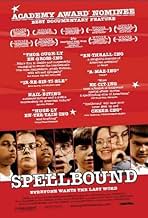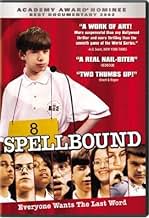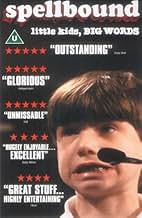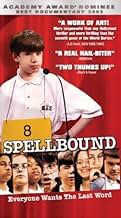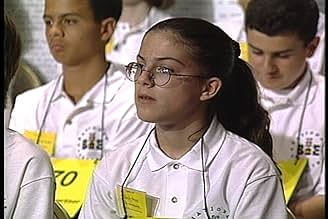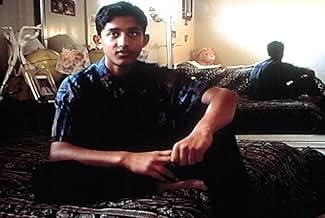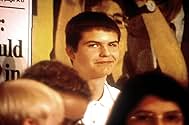CALIFICACIÓN DE IMDb
7.6/10
13 k
TU CALIFICACIÓN
Spellbound sigue a ocho adolescentes en su búsqueda por ganar el Concurso Nacional de Ortografía de 1999.Spellbound sigue a ocho adolescentes en su búsqueda por ganar el Concurso Nacional de Ortografía de 1999.Spellbound sigue a ocho adolescentes en su búsqueda por ganar el Concurso Nacional de Ortografía de 1999.
- Nominado a 1 premio Óscar
- 17 premios ganados y 19 nominaciones en total
Ubaldo Arenivar
- Self - Angela's Father
- (as Ubaldo)
Jorge Arenivar
- Self - Angela's Brother
- (as Jorge)
Scott McGarraugh
- Self - Ranch Owner
- (as Mr. McGarraugh)
Lindy McGarraugh
- Self - Ranch Owner
- (as Mrs. McGarraugh)
Concepción Arenivar
- Self - Angela's Mother
- (as Concepción)
Neelima Marupudi
- Self - Potter County Champion
- (as Neelima)
Parag Lala
- Self - Nupur's Father
- (as Parag)
Meena Lala
- Self - Nupur's Mother
- (as Meena)
Kuna Lala
- Self - Nupur's Brother
- (as Kuna)
Tim Brigham
- Self - Ted's Brother
- (as Tim)
Earl Brigham
- Self - Ted's Father
- (as Earl)
Opiniones destacadas
Doesn't it matter what the words mean more than the letters in them? Wouldn't it do a precocious kid more good to pour over Shakespeare or Jane Austen or Hemingway or even Harry Potter than to turn the pages of a dictionary or be drilled by a parent on how to spell obscure words like "lycanthrope" and "cephalalgia" (or the supremely ironic last word in the final shown here, "logorrhea") which the parents themselves can't even pronounce? When little showoff Harry Altman stumbles and comically grimaces over the word "banns," it seems to me he might be doing better not in the contest, perhaps, but in life to read more books, so he'd become familiar with the custom of "posting the banns," which isn't so obscure as the film and Harry make out, if you've gathered a wide acquaintance with marital customs through reading.
But there is after all a higher significance in all this. America is a self-made country and English in some queer sense is a self-made language, and these general points play into the significance of this surprisingly moving and thought-provoking little film. It's not only the suspense and emotion Spellbound evokes or its fairly tight documentary organization but such more general themes as social mobility and the accessibility of certain sports that make this otherwise conventional movie rise above the ordinary and explain why it's worthy of theatrical distribution and not just a slot on PBS. What would this be like in Italian? That's a language, like some others, whose spellings are so phonetic that a contest like this wouldn't make much sense. But English spellings really don't make much sense. English poses unique problems. The Italian columnist Beppe Severgnini is wrong to have written that it's because we're terrible spellers that spelling bees excite us. An Italian just can't understand. If you say an Italian word, ninety-eight percent of the time (if you're Italian) you know how to spell it. In English, we've got all those tiny vowel differences and remnants of Germanic gutturals and all those endless words from Arabic and Persian and Greek and a hundred other languages that we've transliterated by a hundred different unrelated systems. Why should `Darjeeling,' which so ironically almost stumps the Indian-American Neil Kadakia, be spelled that way and not darjiling or dardjeeling, or who knows what? It's because English spelling had no strict rules till the late nineteenth century; English went through so many growing pains from Chaucer to Shakespeare to Dryden to Jane Austen; because we still have no consistent phonetic system; and because our language has all those endless half-assimilated loan words from other cultures and tongues, that spelling in English is a nightmare and a kind of art, and a truly expert young speller is a real entity worth the chimerical task of seeking him or her out each year.
Spelling bees are a matter of rote knowledge, but success in them can sometimes involve some inspired guessing, and this is shown by the fine tuning contestants are allowed in the DC competition when they ask what language or culture the word comes from. Despite the strong element of memorization, the event attracts and finds ambitious, bright, even rather intellectual kids: lots of hard work maybe, but also some kind of raw brainy talent we don't by any means all have: inspiration and perspiration, the old combination.
The new immigrants in Spellbound are a major force. There are not one but two Indian-Americans in the eight the filmmaker has carefully singled out for special focus, and one of those wins. There's the Mexican girl whose father (so movingly) feels fulfilled, his whole life's journey made worthwhile, just because she has qualified; and he can't even speak English. And there's Ashley, the Black girl from the DC projects who didn't get a trophy or much recognition but dreams, nay prays, to be the winner. And even the boy from rural Tennessee who says there are hardly any other smart kids in his school qualifies as some kind of outsider who magically comes home, and gets put in his place in a complex way, like an Oklahoma valedictorian in the freshman class at Harvard, when he gets to compete in the national spelling bee. .Spellbound itself isn't a profound movie, but it has heart. Like the German WWII film Die Brucke (The Bridge) it shows a group of kids up close and personal and then follows them into battle where one by one they fall, till the last remains, and gets "logorrhea" right (I didn't -- I had to use Spell Check again even though I guessed it right the first time), and becomes champion. And in the emotion of trying so hard and then getting knocked out by one wrong letter, Spellbound illustrates sportsmanship and being all you can be and the joy of competiton and the agony of defeat. It's about poise and maturity and just being a kid. And it's a close, intense analysis of an event a phenomenon, really with more ramifications than we ever realized, till we see it. Spellbound is pretty universal in its appeal and by any accounts it's a wonderful little documentary.
But there is after all a higher significance in all this. America is a self-made country and English in some queer sense is a self-made language, and these general points play into the significance of this surprisingly moving and thought-provoking little film. It's not only the suspense and emotion Spellbound evokes or its fairly tight documentary organization but such more general themes as social mobility and the accessibility of certain sports that make this otherwise conventional movie rise above the ordinary and explain why it's worthy of theatrical distribution and not just a slot on PBS. What would this be like in Italian? That's a language, like some others, whose spellings are so phonetic that a contest like this wouldn't make much sense. But English spellings really don't make much sense. English poses unique problems. The Italian columnist Beppe Severgnini is wrong to have written that it's because we're terrible spellers that spelling bees excite us. An Italian just can't understand. If you say an Italian word, ninety-eight percent of the time (if you're Italian) you know how to spell it. In English, we've got all those tiny vowel differences and remnants of Germanic gutturals and all those endless words from Arabic and Persian and Greek and a hundred other languages that we've transliterated by a hundred different unrelated systems. Why should `Darjeeling,' which so ironically almost stumps the Indian-American Neil Kadakia, be spelled that way and not darjiling or dardjeeling, or who knows what? It's because English spelling had no strict rules till the late nineteenth century; English went through so many growing pains from Chaucer to Shakespeare to Dryden to Jane Austen; because we still have no consistent phonetic system; and because our language has all those endless half-assimilated loan words from other cultures and tongues, that spelling in English is a nightmare and a kind of art, and a truly expert young speller is a real entity worth the chimerical task of seeking him or her out each year.
Spelling bees are a matter of rote knowledge, but success in them can sometimes involve some inspired guessing, and this is shown by the fine tuning contestants are allowed in the DC competition when they ask what language or culture the word comes from. Despite the strong element of memorization, the event attracts and finds ambitious, bright, even rather intellectual kids: lots of hard work maybe, but also some kind of raw brainy talent we don't by any means all have: inspiration and perspiration, the old combination.
The new immigrants in Spellbound are a major force. There are not one but two Indian-Americans in the eight the filmmaker has carefully singled out for special focus, and one of those wins. There's the Mexican girl whose father (so movingly) feels fulfilled, his whole life's journey made worthwhile, just because she has qualified; and he can't even speak English. And there's Ashley, the Black girl from the DC projects who didn't get a trophy or much recognition but dreams, nay prays, to be the winner. And even the boy from rural Tennessee who says there are hardly any other smart kids in his school qualifies as some kind of outsider who magically comes home, and gets put in his place in a complex way, like an Oklahoma valedictorian in the freshman class at Harvard, when he gets to compete in the national spelling bee. .Spellbound itself isn't a profound movie, but it has heart. Like the German WWII film Die Brucke (The Bridge) it shows a group of kids up close and personal and then follows them into battle where one by one they fall, till the last remains, and gets "logorrhea" right (I didn't -- I had to use Spell Check again even though I guessed it right the first time), and becomes champion. And in the emotion of trying so hard and then getting knocked out by one wrong letter, Spellbound illustrates sportsmanship and being all you can be and the joy of competiton and the agony of defeat. It's about poise and maturity and just being a kid. And it's a close, intense analysis of an event a phenomenon, really with more ramifications than we ever realized, till we see it. Spellbound is pretty universal in its appeal and by any accounts it's a wonderful little documentary.
In one sense, the U.S. National Spelling Bee is a strange thing, a freakish competition for freaks to take part in, and designed to make them only more freakish. You don't have to understand the words to win, you merely have to spell them, and the winner would seem to have proved little else than their willingness to work hard for no social benefit, and their ability to withstand extreme pressure. Make no mistake, the kids featured in this documentary are bright and talented, but one can't help but wonder whether such ruthless competition, or the attitude that they are in some sense a "gifted" elite, is really good for society or for the individuals themselves.
But it's not the competition that makes 'Spellbound', a documentary about 1999's contest, so gripping (we follow eight of the 249 finalists, but the film is sympathetic to them all, and does not encourage us to set one against the rest). Rather, this comes from the way the 'Spellbound' reminds us what a diverse country America is: ethnically, socially, physically. These kids come from all over, and while on one hand we see a very unusual slice of American life in this film, it's nonetheless a surprisingly broad one. Some of the contrasts are obvious: a family of Indian descent say that in America, if you work hard, you will succeed; but we also meet a family of Mexican descent (who consider that they have worked hard and succeeded, but who have little compared with the Indians), and a black family in a grim district of Washington (arguably failing to thrive after several hundred years). Yet in spite of their differences, their children are all (give or take the final few words) as good as each other (at least when it comes to spelling). Today, social mobility in America is lower than in Europe; but the old American dream, it seems, lives on in the spelling bee. And although the extreme preparation of most competitors appears to place a ludicrously inflated value on the work ethic, and though some (though not all) of the parents are frighteningly pushy, there's also something quite sweet, in this age of guns and violence, in such a fierce competition fought only with words.
'Spellbound' is filmed without tricks, or any special artiness, but nonetheless offers an unexpected insight into contemporary American society. But please let us not copy them and bring the bee back here!
But it's not the competition that makes 'Spellbound', a documentary about 1999's contest, so gripping (we follow eight of the 249 finalists, but the film is sympathetic to them all, and does not encourage us to set one against the rest). Rather, this comes from the way the 'Spellbound' reminds us what a diverse country America is: ethnically, socially, physically. These kids come from all over, and while on one hand we see a very unusual slice of American life in this film, it's nonetheless a surprisingly broad one. Some of the contrasts are obvious: a family of Indian descent say that in America, if you work hard, you will succeed; but we also meet a family of Mexican descent (who consider that they have worked hard and succeeded, but who have little compared with the Indians), and a black family in a grim district of Washington (arguably failing to thrive after several hundred years). Yet in spite of their differences, their children are all (give or take the final few words) as good as each other (at least when it comes to spelling). Today, social mobility in America is lower than in Europe; but the old American dream, it seems, lives on in the spelling bee. And although the extreme preparation of most competitors appears to place a ludicrously inflated value on the work ethic, and though some (though not all) of the parents are frighteningly pushy, there's also something quite sweet, in this age of guns and violence, in such a fierce competition fought only with words.
'Spellbound' is filmed without tricks, or any special artiness, but nonetheless offers an unexpected insight into contemporary American society. But please let us not copy them and bring the bee back here!
NOTE TO SELF: No typos allowed in this review!
I was an excellent speller in school. I thought I was still pretty good now...until the pre-teen dynamos in 'Spellbound' left me in the dust. As 'Bowling For Columbine's chief competition for the 2002 Best Documentary Oscar, this modest gem about 8 contenders for the '99 National Spelling Bee is thrilling. Read that sentence again. A documentary about spelling is thrilling. Wow! How? Is it gripping to see a kid standing in front of a microphone, desperately trying to figure out how to spell words that most of us can't even pronounce? You bet it is. Who needs guns and explosions? THIS is tension.
When one of the girls crumbles and misspells a word, my heart sank. Really, how can you not root for all of these kids? Each entrant in the competition is a super-smart youngster, and it's not cheesy to say they're all winners for having gotten to the National Bee in the first place. Director Jeffrey Blitz can't focus on all of the spellers, so he chooses to highlight 5 girls and 3 boys. We see them at home as they & their families give us the low-down on what makes these brainiacs tick. Then it's off to the Bee, where it's high drama as errors are made and the field is whittled down, one by one.
I was cheering for all of Blitz's star spellers, but Harry Altman was my favourite. He's a hyperactive weirdo and I liked him immediately. Harry is the stand-out oddball in a group of diligent, nerdy types who share the stage. As engaging as he is, it's wonderful that this contest allows for quiet, shy, so-called geeks to be stars. This is the Super Bowl for scholars and it showcases kids from all backgrounds. Plus, there are about as many girls as there are boys. Truly, if you're a great speller, that's good enough.
'Spellbound' is the rare documentary that's more entertaining than it is informative. The kids reveal a great deal about themselves in the interviews, but the film is always building to the climactic moment when one of the last two children makes a mistake and the other wins the crown. You might be surprised by the result, although you shouldn't be. It's almost a 'Hoosiers' moment when the winning speller clinches the title. Every single kid in this movie is a better speller than anybody I know. If they want a job, I could use a proof-reader...even if that proof-reader is a lot smarter than me.
I was an excellent speller in school. I thought I was still pretty good now...until the pre-teen dynamos in 'Spellbound' left me in the dust. As 'Bowling For Columbine's chief competition for the 2002 Best Documentary Oscar, this modest gem about 8 contenders for the '99 National Spelling Bee is thrilling. Read that sentence again. A documentary about spelling is thrilling. Wow! How? Is it gripping to see a kid standing in front of a microphone, desperately trying to figure out how to spell words that most of us can't even pronounce? You bet it is. Who needs guns and explosions? THIS is tension.
When one of the girls crumbles and misspells a word, my heart sank. Really, how can you not root for all of these kids? Each entrant in the competition is a super-smart youngster, and it's not cheesy to say they're all winners for having gotten to the National Bee in the first place. Director Jeffrey Blitz can't focus on all of the spellers, so he chooses to highlight 5 girls and 3 boys. We see them at home as they & their families give us the low-down on what makes these brainiacs tick. Then it's off to the Bee, where it's high drama as errors are made and the field is whittled down, one by one.
I was cheering for all of Blitz's star spellers, but Harry Altman was my favourite. He's a hyperactive weirdo and I liked him immediately. Harry is the stand-out oddball in a group of diligent, nerdy types who share the stage. As engaging as he is, it's wonderful that this contest allows for quiet, shy, so-called geeks to be stars. This is the Super Bowl for scholars and it showcases kids from all backgrounds. Plus, there are about as many girls as there are boys. Truly, if you're a great speller, that's good enough.
'Spellbound' is the rare documentary that's more entertaining than it is informative. The kids reveal a great deal about themselves in the interviews, but the film is always building to the climactic moment when one of the last two children makes a mistake and the other wins the crown. You might be surprised by the result, although you shouldn't be. It's almost a 'Hoosiers' moment when the winning speller clinches the title. Every single kid in this movie is a better speller than anybody I know. If they want a job, I could use a proof-reader...even if that proof-reader is a lot smarter than me.
When one says that they are excited to see a documentary on the 8th graders' National Spelling Bee, that person is met with a look and an `Oooookaaaay
.' I was on the receiving end of these looks for the last two years when I wanted to see `Spellbound', Jeffrey Blitz's 2002 documentary about the `spelling elite'. I finally got my wish recently and was thrilled that it met (and exceeded) my high expectations for the film.
For `Spellbound', Blitz traveled around the United States and chose eight competitors, aged 11-14, to profile before the eventual climax of the actual spelling bee. We see the home lives of the eight students, who range from poverty to upper middle class affluence, single parent families, and two-parent homes. There are even Archie and Edith Bunker reincarnated as the parents of one girl, and another girl whose parents, though having lived in the United States for over twenty years, don't speak English. Though these students come from fairly different backgrounds, they seem to be treated slightly different because of their intelligence, and therefore descend upon Washington D.C. for the Spelling Bee with a commonality.
`Spellbound' is Jeffrey Blitz's first film and he already exhibits a masterful eye for the documentary genre. Though the profiles are fairly routine, the second half of the film, the Spelling Bee itself, is so compelling that I felt the same effect as your average suspense film. The viewer is naturally led to pick a `favorite', though not guided to any specific child. My `favorite' was knocked out fairly early and I truly felt something. There is nothing fancy about the camera work, there are no stark white backgrounds or a Phillip Glass score, or a reactionary topic. What I felt while watching this film was that I was sitting among the audience and letting the camera be my guide one of the most important elements of a good documentary film.
Whether you think the subject matter isn't worthy of an hour and a half treatment, or didn't notice it in the year of `Bowling for Columbine' (which beat `Spellbound' to win the Best Documentary Oscar for 2003) I would recommend picking up this film. It's heart breaking at times, but mostly, inspirational because some of these kids have more maturity in one arm than a lot of adults I know, and their grace under pressure is both awe-inspiring and something to aspire to.
--Shelly
For `Spellbound', Blitz traveled around the United States and chose eight competitors, aged 11-14, to profile before the eventual climax of the actual spelling bee. We see the home lives of the eight students, who range from poverty to upper middle class affluence, single parent families, and two-parent homes. There are even Archie and Edith Bunker reincarnated as the parents of one girl, and another girl whose parents, though having lived in the United States for over twenty years, don't speak English. Though these students come from fairly different backgrounds, they seem to be treated slightly different because of their intelligence, and therefore descend upon Washington D.C. for the Spelling Bee with a commonality.
`Spellbound' is Jeffrey Blitz's first film and he already exhibits a masterful eye for the documentary genre. Though the profiles are fairly routine, the second half of the film, the Spelling Bee itself, is so compelling that I felt the same effect as your average suspense film. The viewer is naturally led to pick a `favorite', though not guided to any specific child. My `favorite' was knocked out fairly early and I truly felt something. There is nothing fancy about the camera work, there are no stark white backgrounds or a Phillip Glass score, or a reactionary topic. What I felt while watching this film was that I was sitting among the audience and letting the camera be my guide one of the most important elements of a good documentary film.
Whether you think the subject matter isn't worthy of an hour and a half treatment, or didn't notice it in the year of `Bowling for Columbine' (which beat `Spellbound' to win the Best Documentary Oscar for 2003) I would recommend picking up this film. It's heart breaking at times, but mostly, inspirational because some of these kids have more maturity in one arm than a lot of adults I know, and their grace under pressure is both awe-inspiring and something to aspire to.
--Shelly
10jotix100
Jeffrey Blitz, the director of this documentary had the bright idea to show us what goes behind the scenes in this competition that some of us only see as a television news clip when it is shown as the last finalist spells the hard word correctly every year in the spring, or inside a newspaper with the picture of the winner.
I didn't get a chance to see it until recently because I thought it was not going to be any good. Since I was attending a screening with a handicapped relative, and all the other films were sold out, we decided to see this one thinking it was going to be empty. Well, as we arrived early, we had our choice seats and slowly, but surely, people started to come in, to the point that all seats were taken!
This was a delightful inside view of what these teen agers go through in preparing for the competition. The kids are so charming and so alive and so much into the spirit of the contest that the viewer has more sympathy for the parents that sit in the audience. They suffer the most because for the contestants, even though it is a prestigious game, they maintain their cool even in the roughest moments.
In a way it also points out to what degree some immigrant parents, especially the Indians that appear in the documentary are involved in their children's school achievements. Year after year the winner is the son or daughter of someone from either India, Pakistan, or another Eastern country that has settled here because of the opportunities these children will have in the United States.
This documentary should be required viewing in schools throughout the country. Both teachers and students should benefit by watching it.
I didn't get a chance to see it until recently because I thought it was not going to be any good. Since I was attending a screening with a handicapped relative, and all the other films were sold out, we decided to see this one thinking it was going to be empty. Well, as we arrived early, we had our choice seats and slowly, but surely, people started to come in, to the point that all seats were taken!
This was a delightful inside view of what these teen agers go through in preparing for the competition. The kids are so charming and so alive and so much into the spirit of the contest that the viewer has more sympathy for the parents that sit in the audience. They suffer the most because for the contestants, even though it is a prestigious game, they maintain their cool even in the roughest moments.
In a way it also points out to what degree some immigrant parents, especially the Indians that appear in the documentary are involved in their children's school achievements. Year after year the winner is the son or daughter of someone from either India, Pakistan, or another Eastern country that has settled here because of the opportunities these children will have in the United States.
This documentary should be required viewing in schools throughout the country. Both teachers and students should benefit by watching it.
¿Sabías que…?
- TriviaIn 2007, it was added to "IDA's Top 25 Documentaries" of all-time by the International Documentary Association ranked #4.
- ErroresWhile interviewing Harry in his room the boom mic is deliberately shown after Harry asks "Is that thing edible?"
- Citas
Harry Altman - Spelling Bee Participant: Does this sound like a musical robot?
- Créditos curiososThere is no cast list; a cast member is considered credited if a subtitle or an item in the film prints the name (or partial name).
- ConexionesFeatured in The 2003 IFP Independent Spirit Awards (2003)
Selecciones populares
Inicia sesión para calificar y agrega a la lista de videos para obtener recomendaciones personalizadas
- How long is Spellbound?Con tecnología de Alexa
Detalles
Taquilla
- Total en EE. UU. y Canadá
- USD 5,728,581
- Fin de semana de estreno en EE. UU. y Canadá
- USD 17,508
- 4 may 2003
- Total a nivel mundial
- USD 7,457,710
Contribuir a esta página
Sugiere una edición o agrega el contenido que falta



